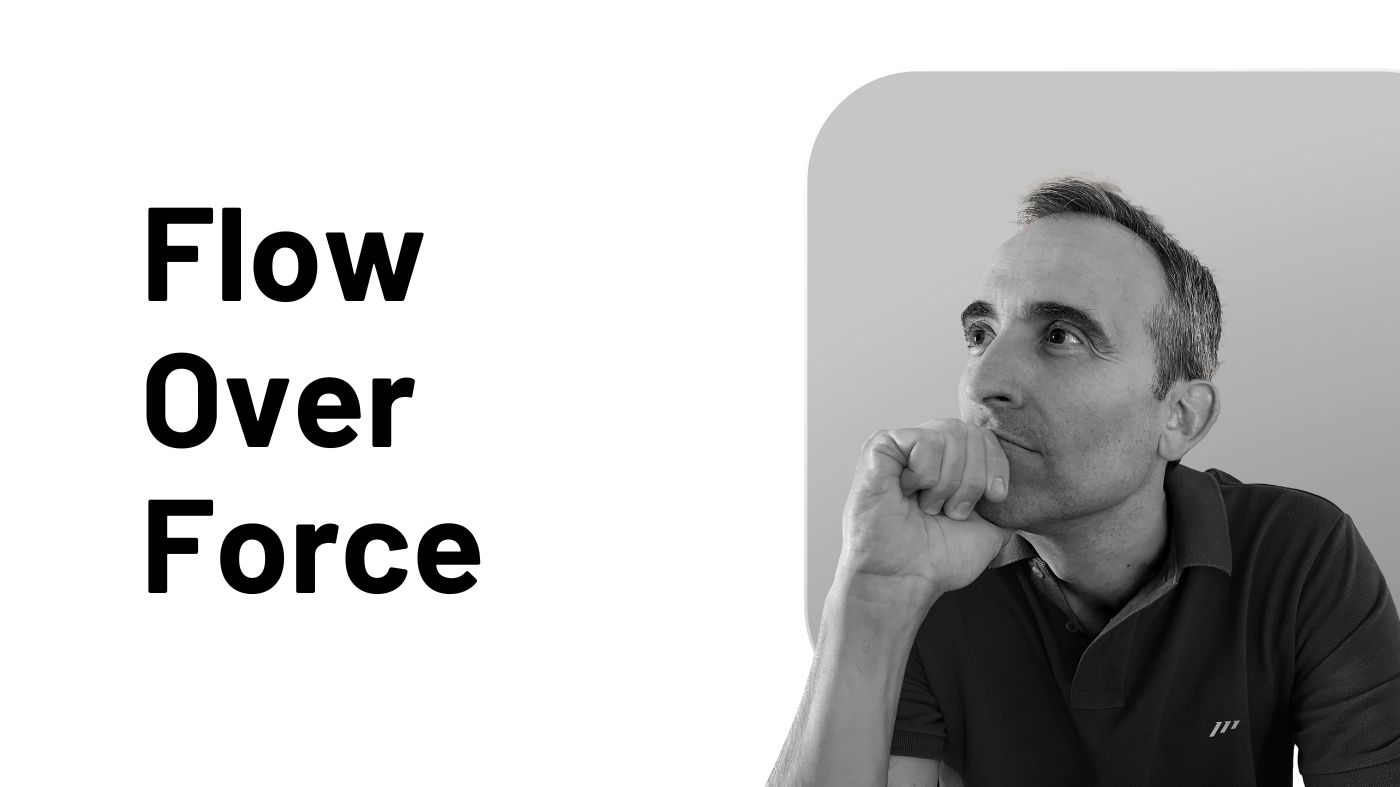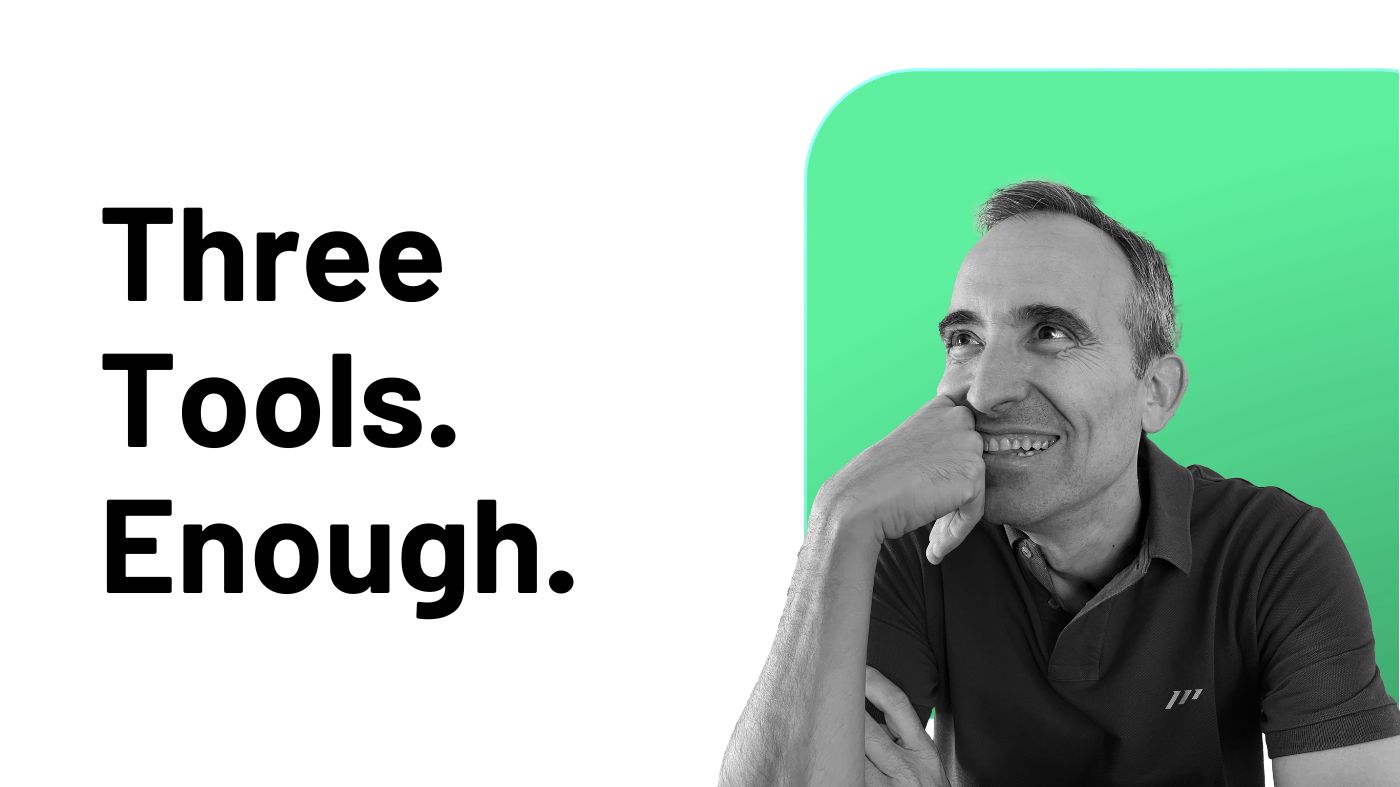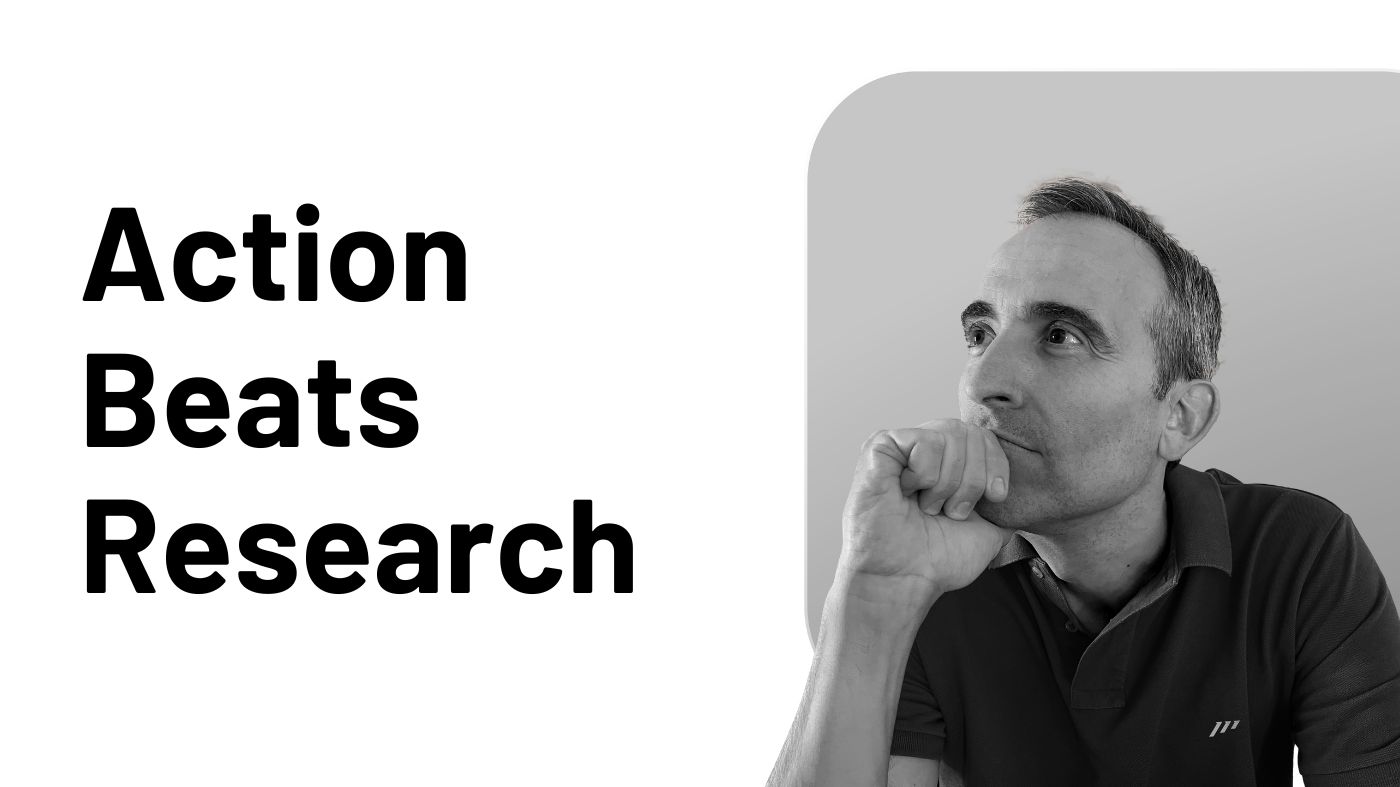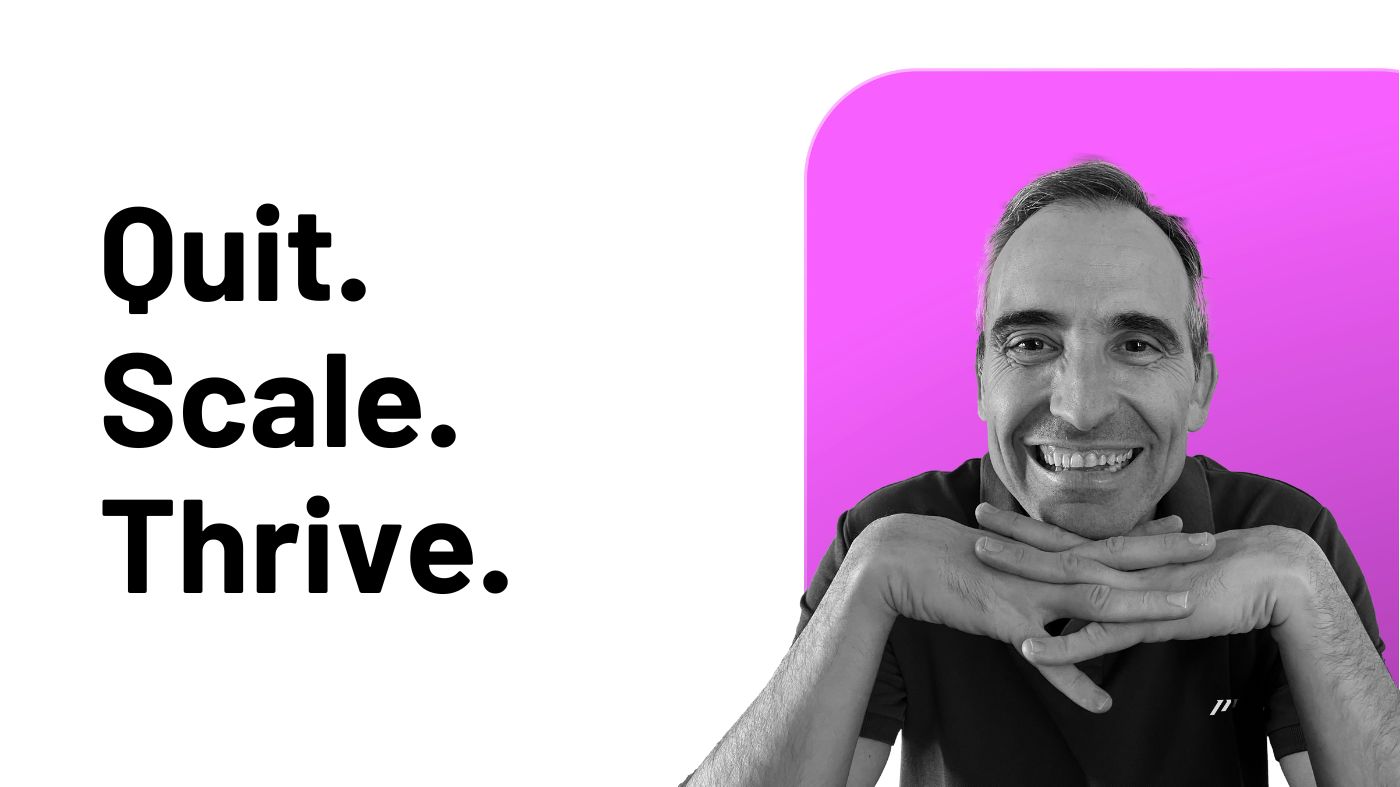You’re three hours into what should have been a productive morning when the fourth “urgent” email lands in your inbox.
Your carefully planned day dissolves as you pivot between crisis management, stakeholder demands, and the strategic work that actually moves your business forward.
You know this feeling.
Here’s what’s actually happening: You’re fighting a battle that was lost 2,500 years ago.
At 17, when I first encountered philosophy, I dismissed it as abstract nonsense with no relevance to real problems. But something about it intrigued me. It was completely foreign to everything I knew, so I decided to give it a chance.
That decision changed everything.
Over the next 33 years, from computer science engineer to serial entrepreneur, I’ve never stopped studying philosophy.
I discovered that the deepest theoretical insights become the most practical solutions. The professionals who thrive long-term aren’t just tactical executors. They’re deep thinkers who understand the fundamental principles governing their challenges.
“The measure of intelligence is the ability to change.” — Albert Einstein
A Greek philosopher named Heraclitus figured out why every productivity system eventually fails.
While his contemporaries searched for permanent solutions to temporary problems, Heraclitus made a radical assertion that modern neuroscience now validates: trying to create stability in an inherently unstable world is what creates the chaos.
This isn’t abstract philosophy.
It’s the theoretical foundation that explains why you abandon every productivity system within months.
Without understanding the underlying principles of how change actually works, you’re building solutions on quicksand. They look solid until reality tests them.
“You cannot step into the same river twice,” Heraclitus observed.
The river looks the same, but the water is always moving.
Your business looks the same from the outside, but the challenges, opportunities, and demands flow through it like that moving water.
Most productivity systems fail because they’re built on shallow thinking: the assumption that you can create permanent solutions to temporary problems.
They promise perfect schedules, ultimate filing systems, final workflows that will solve productivity forever.
This approach ignores 2,500 years of philosophical insight and decades of cognitive science.
Heraclitus understood what modern neuroscience now proves: our brains are designed to adapt, not follow rigid patterns.
When you force thinking into inflexible systems, you create cognitive resistance that drains mental energy.
The solution isn’t better time management. It’s deeper thinking. What Heraclitus called “logos,” the underlying pattern that governs change itself.
When you align your productivity system with how change actually works, you stop fighting the current and start flowing with it.
This is why theory matters.
Without understanding the fundamental principles, you’re stuck cycling through surface-level solutions that break under pressure. But when you ground your approach in solid theoretical foundations, you build systems that adapt and strengthen over time.
In this article:
-
I’ll reveal why every productivity system you’ve tried has failed and why the most successful leaders approach productivity from a completely different philosophical foundation.
-
You’ll discover the ancient insight that modern cognitive science validates, understand why your current approach creates mental friction instead of flow, and see how the deepest theoretical thinking becomes the most practical competitive advantage.
This philosophical insight, validated by modern systems theory and cognitive science, forms the foundation of ICOR®, a methodology my partner Tom Solid and I developed through decades of real-world testing in corporate leadership and entrepreneurship to help busy professionals design, build, and implement with any tools a productivity system end to end.
ICOR® represents a fundamentally different way of thinking about productivity.
While others offer tactics and tools, we offer a “philosophical framework” that transforms how you understand the relationship between your thinking, your tools, and the chaos of professional life.
This isn’t just theory. It’s the theoretical foundation that makes everything else work.
Why Your Productivity System Keeps Breaking
Every productivity guru promises the same thing: follow their system, and you’ll finally have control.
Yet within weeks, you’re back to feeling overwhelmed, your carefully constructed workflows crumbling under the weight of real work.
The problem isn’t your discipline. It’s that these productivity systems ignore a fundamental truth: you can’t solve dynamic problems with static solutions.
Most productivity gurus treat chaos as the enemy. They promise that the right tool, perfect filing system, or ultimate workflow will finally give you control.
But chaos isn’t the problem: fighting it is.
“Life is a series of natural and spontaneous changes. Don’t resist them; that only creates sorrow. Let reality be reality.” — Lao Tzu
Think about your last productivity system failure.
You probably blamed yourself for lacking consistency or discipline. But the real issue was architectural: you built a system designed for a static world in a dynamic reality.
Here’s what actually happens:
-
You start with enthusiasm, following the prescribed structure.
-
Then real work hits. Unexpected priorities. Urgent crises. Complex projects that don’t fit neat categories.
-
The productivity system that promised simplicity becomes another source of stress.
-
You abandon it and try something new.
-
The cycle repeats.
This isn’t system failure. It’s philosophical failure.
These approaches assume that productivity comes from imposing order on chaos.
Heraclitus knew better: true order emerges from understanding chaos, not fighting it.
The Science Behind Ancient Wisdom
Here’s what’s remarkable: modern neuroscience is proving what Heraclitus intuited 2,500 years ago through pure philosophical insight.
The brain that fights change creates its own suffering. The brain that flows with change thrives.
This isn’t metaphor. It’s measurable neuroscience.
Dr. Michael Merzenich’s research at UCSF shows that your neural networks reorganize constantly.
What worked for your brain six months ago may create cognitive resistance today because your neural architecture has fundamentally changed.
Most productivity advice ignores this reality. It assumes your brain works like a computer: same inputs, same outputs. But your brain evolved for 300,000 years to adapt, not to follow rigid protocols.
Complexity scientist Stuart Kauffman discovered that the most resilient systems maintain stability through change, not despite it. Your brain works exactly this way: maintaining coherence while continuously reorganizing.
Force it into rigid patterns and you create what neuroscientist Dr. Daniel Siegel calls “neural rigidity,” the cognitive equivalent of forcing a river uphill.
ICOR®’s design reflects these scientific principles. Each stage operates as what systems theorists call an “attractor,” a stable pattern that can accommodate infinite variations while maintaining its essential function.
For example, ICOR®’s first stage, Input, doesn’t dictate how you gather information: it provides principles that work whether you’re processing emails or having insights during morning runs.
The pattern stays stable while adapting to your cognitive state.
Dr. Matthew Lieberman’s UCLA research explains why this reduces mental fatigue: when your productivity system aligns with natural brain patterns, it operates below conscious awareness. You’re not managing a system: you’re thinking through it.
Traditional productivity creates “ego depletion:” every micro-decision about organizing or prioritizing drains mental energy. ICOR® eliminates these decisions by matching your brain’s existing architecture.
Dr. Marcus Raichle’s research on the brain’s default mode network reveals why integration works: your brain doesn’t distinguish between “internal” thoughts and “external” tools. It treats anything supporting your cognitive processes as part of your extended neural network.
This is why ICOR® becomes invisible after implementation. Users aren’t using a productivity system: they’re thinking and executing more effectively.
The tools become as natural as memory because they operate according to the same cognitive principles.
Ancient wisdom validated by modern science.
Heraclitus was right: true order emerges when you align with the underlying patterns of change itself.
The River Principle: Building Systems That Flow
The most effective leaders share a counterintuitive trait: they don’t try to control their environment. They design systems that flow with it.
This isn’t about being passive or reactive. It’s about understanding what Heraclitus called “logos,” the underlying pattern that governs change itself.
Think about the most effective leaders you know.
They don’t follow identical daily routines. They don’t use the same decision-making process for every situation. Instead, they’ve developed what I call “flow principles” that guide their adaptation to changing circumstances.
This is where most productivity advice goes wrong.
It focuses on the visible structures rather than the invisible principles that govern how those structures should change.
Logos isn’t about predicting specific changes. It’s about understanding the patterns behind change itself.
When you grasp these patterns, you can build productivity systems that thrive on unpredictability instead of breaking under it.
“You must be shapeless, formless, like water. When you pour water in a cup, it becomes the cup… Be water, my friend.” — Bruce Lee
ICOR® operates on this same principle.
Rather than forcing you to follow identical processes regardless of context, it provides a holistic methodology that flows seamlessly from information acquisition to tangible results.
The four stages of ICOR® (Input, Control, Output, Refine) create a continuous cycle that mirrors how your brain naturally processes information and generates action:
-
Input gathers essential information from your environment or inner thoughts.
-
Control transforms this raw data into actionable tasks.
-
Output implements these tasks to generate real results toward your goals.
-
Refine enhances the entire productivity system through iteration and improvement.
The genius lies in the flow between stages.
During crisis management, you cycle rapidly between Input and Control.
In strategic planning phases, Refine becomes dominant while Output continues in the background.
The methodology adapts to what you need, when you need it.
This is the difference between principles and practices.
Most methodologies teach rigid practices. ICOR® teaches adaptive principles.
You’re not following a script: you’re thinking systematically.
One Brain, Two Parts: The Systems Solution
Here’s the breakthrough that changes everything: You don’t have a biological brain and separate digital tools. You have one integrated cognitive system with two parts.
This isn’t semantic wordplay. It’s a fundamental reframe that eliminates the source of most productivity friction.
ICOR® is built on a fundamentally different premise: your smartphone, apps, and digital tools aren’t external accessories you manage. They’re neural extensions of your thinking process.
When you truly grasp this, productivity stops being about managing multiple systems and becomes about thinking through one integrated system.
Think about how your brain already works.
When you remember a client meeting, your hippocampus doesn’t work alone. It coordinates with your prefrontal cortex for context, your amygdala for emotional significance, your motor cortex for physical actions. The complete memory emerges from these integrated parts working as one system.
ICOR® extends this natural integration to include your digital tools.
Your project management software becomes part of your executive function. Your note-taking and PKM tool becomes part of your memory. Your smartphone becomes your sensory input system.
The result is transformational. Instead of constant mental friction translating between your natural thinking and artificial systems, everything flows seamlessly.
Consider how this works in practice.
When you capture an idea during a meeting, you’re not transferring information from your brain to a digital tool. You’re creating a distributed memory that exists across both systems simultaneously. Your brain retains the emotional context and connections while your digital system preserves the precise details and makes them searchable.
Most people spend enormous mental energy managing the gap between how they think and how their tools work. ICOR® eliminates that gap entirely.
The four stages mirror your brain’s natural processing: Input matches your sensory gathering, Control parallels executive decision-making, Output aligns with implementation, Refine mirrors continuous learning.
This isn’t accident.
Tom Solid and I discovered these patterns the hard way, through decades of our own trial and error. We tried every productivity system, failed with each one, then had to solve our own problems. ICOR® emerged from our personal struggle to find what actually works in the chaos of professional life.
The transformation is immediate.
Users report feeling less overwhelmed while handling more complex work. They’re not managing systems anymore: they’re thinking through an integrated system (a productivity system end to end) that feels as natural as thought itself.
This is the competitive advantage of true integration: your productivity system becomes invisible because it operates the same way your mind operates.
When Change Becomes Your Competitive Advantage
Here’s the ultimate irony: while your competitors exhaust themselves fighting change, you can turn that same change into your competitive weapon.
Most professionals treat every unexpected priority, urgent crisis, or shifting deadline as productivity kryptonite. They’re wrong. These disruptions aren’t obstacles to productivity: they’re opportunities to demonstrate superior thinking.
When you build your productivity system on Heraclitean principles, something remarkable happens. The same changes that overwhelm your competitors become opportunities for you to excel. While they’re paralyzed by disruption, you’re energized by it.
This isn’t mindset work: it’s cognitive architecture.
When your productivity system flows with change instead of fighting it, your brain treats chaos as useful information rather than existential threat.
Consider how this plays out in practice.
When a major client changes project requirements at the last minute, traditional productivity approaches create cognitive overload. Existing plans become psychological baggage. Mental energy gets wasted mourning disrupted schedules.
But flow-based thinkers process the same disruption as valuable data:
-
Input immediately gathers new information.
-
Control clarifies what the change actually requires.
-
Output adapts execution seamlessly.
-
Refine captures insights for next time.
The same external event that paralyzes competitors becomes a demonstration of cognitive superiority.
Clients notice this difference viscerally.
They start bringing their most complex, highest-value challenges to leaders who thrive under pressure rather than those who crumble under it.
“There is nothing so practical as a good theory.” — Kurt Lewin
This creates compounding advantages.
As you become known for thriving in chaos, you attract the most challenging opportunities. Each successful navigation strengthens your cognitive flexibility and market reputation.
You’re not just productive: you’re antifragile. Stronger under pressure, not weaker.
Meanwhile, competitors become increasingly brittle. Every change they resist makes the next disruption harder to handle. Their rigid productivity systems drain more energy while providing less flexibility.
The business implications are profound.
In volatile markets, the ability to adapt quickly becomes more valuable than the ability to execute predetermined plans. Clients pay premium rates for partners who can navigate uncertainty rather than those who create additional rigidity.
But the personal benefits might be even more significant.
When you stop fighting change and start flowing with it, work becomes energizing rather than draining. You experience what psychologist Mihaly Csikszentmihalyi calls “flow state” more frequently, that effortless engagement where challenge and skill align perfectly.
This isn’t coincidence.
Flow state emerges when your cognitive system operates in harmony with environmental demands rather than resistance to them.
ICOR®’s design principles create the conditions where flow becomes your default mode of operation rather than a rare exception.
Heraclitus believed that wisdom comes from understanding the logos, the underlying pattern that governs all change.
In business terms, this means recognizing that adaptability isn’t just a survival skill. It’s the ultimate competitive advantage in a world where the only constant is change itself.
When change becomes your ally rather than your enemy, you don’t just survive disruption. You profit from it.
This explains why some leaders effortlessly handle complexity that overwhelms others. It’s not superior intelligence: it’s superior system architecture.




